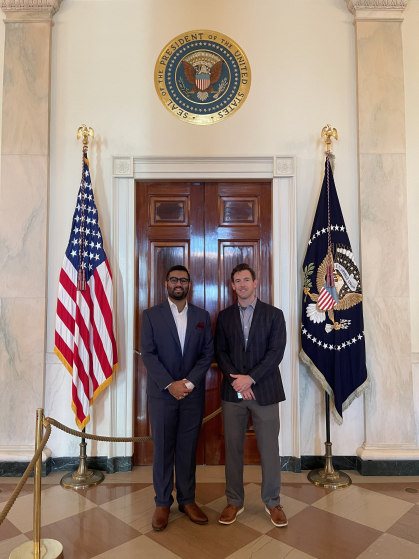Navy to Dentistry
Daniel Brigham’s resume is so versatile that it would stand out in any pool. He has a background in political science, taught English in China, joined the Navy, and worked in the corporate world.
“Changing careers often has suited me because it has kept life interesting,” he said, “and it's made things more challenging.”
But he hopes the last stop in his career journey will be dentistry. He’s a second-year student at Rutgers School of Dental Medicine’s (RSDM) traditional DMD program. After launching his career, he aspires to become an advocate for underserved communities and veterans.
Brigham has been with the Navy for 12 years and is still in the Reserves. He joined the Navy because it combined his interest in travel, international relations, and water—a perk of growing up on the coast of Maryland. At 28, he became a surface warfare officer. His first ship was a destroyer homeported in Japan. Then he moved to San Diego, California, and was put in charge of 60 sailors on a larger ship. “We went to a lot of countries in the Middle East,” he said. They also had a dentist on board. “Sometimes I would go down and observe some dental procedures for fun,” he said. “I was like, ‘Okay, this seems kind of cool.’”
But it hadn’t crossed his mind to become a dentist until many years later when he left the Navy and began working at an IT company. Brigham and his team implemented electronic health records and computer software systems in hospitals. When a close friend of his from the Navy became a dentist, that gave Brigham the idea and made him feel it was a possibility.

He quit his IT job and went back to school for two years to take prerequisites for dental school. In the meantime, he worked part-time in the Reserves. As he was getting ready to enroll at RSDM, he was mobilized to the Middle East, delaying dental school for two years.
“It's been a long journey, but I think that it'll be fulfilling,” said Brigham, who will be 42 when he completes the program. “There are pros and cons to starting a career this late, but for me, it was the right thing to do. I wouldn't trade the experiences I had for anything. I was much shyer, more introverted as a 22-year-old, so I think it'll be much easier to work with patients now.”
At RSDM, he's been finding support from his classmates. “They’re just awesome,” he said. “It’s a difficult program, but my classmates make the process a lot easier. They’ve been very generous helping me in the lab, sharing notes and resources, preparing for tests.”
Recently, he went to Washington DC with the American Institute of Dental Public Health's Federal Service Immersion Program. It took him to the National Institute of Health, Health Resources and Services Administration, and the Hill, where he met with professionals and congressmen working on dental public health policy.
“It was very inspiring,” he said. “That might be another avenue that I would pursue in the future. … Because I would like to be more involved with dentistry beyond the daily clinical practice.”


